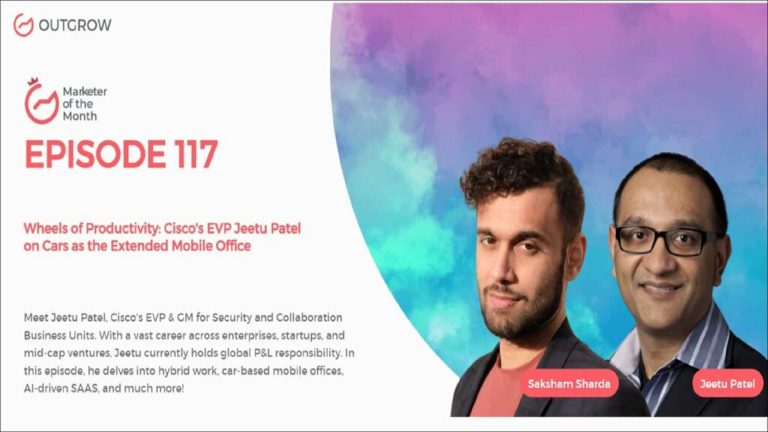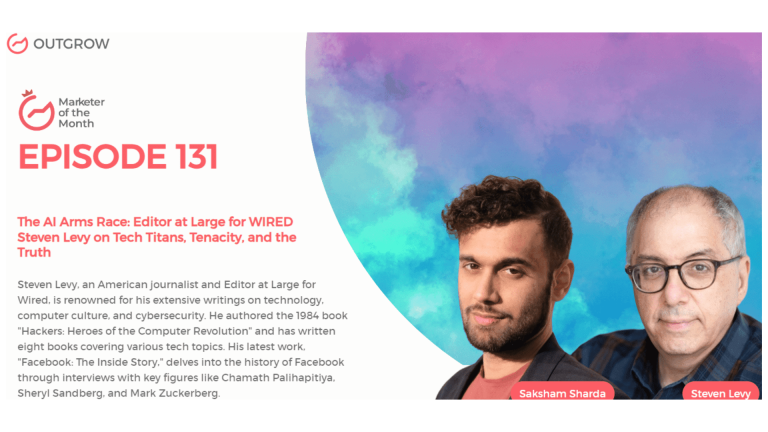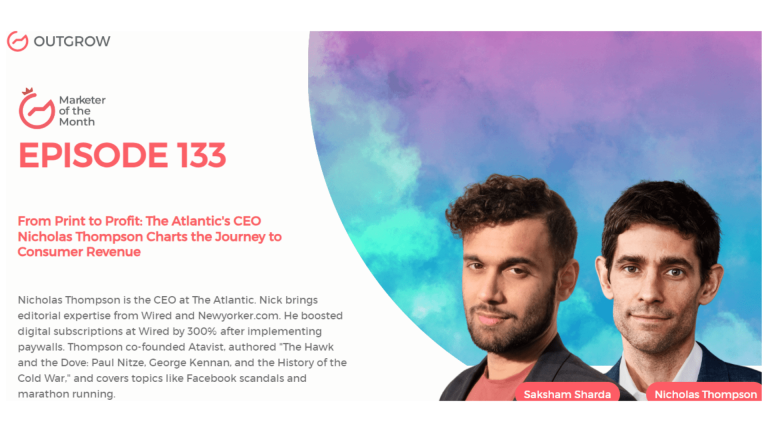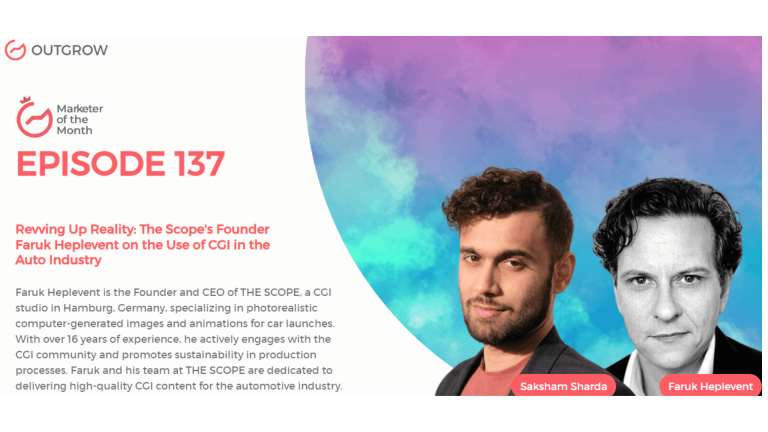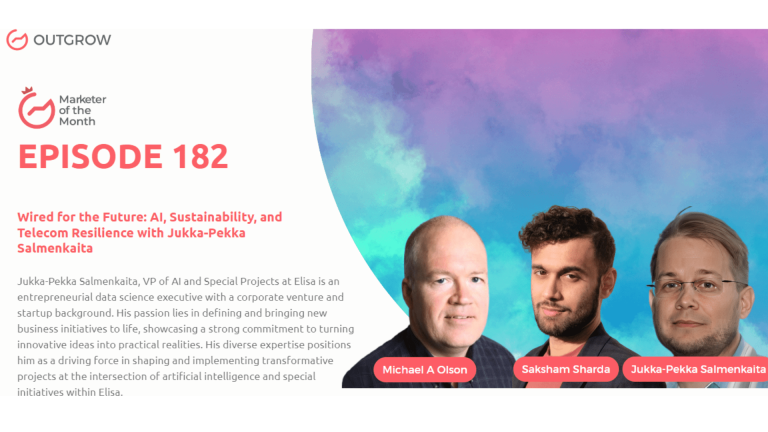Summarize with :
EPISODE 125: Marketer of the Month Podcast with Timo Hallantie
Table of Contents
Hey there! Welcome to the Marketer Of The Month blog!
We recently interviewed Timo Halliante for our monthly podcast – ‘Marketer of the Month’! We had some amazing insightful conversations with Timo and here’s what we discussed about-
1. EIC Pathfinder Program: Supporting innovators in realizing breakthrough technology dreams aligned with the EIC’s goals.
2. Involvement in 3D materials, spintronics, and quantum technologies.
3. The crucial role of SMEs as innovative drivers.
4. Addressing funding and financing needs, including public investment.
5. Key drivers for successful international collaboration in R&D and innovation policies.
6. Emerging technologies with potential societal impact, such as fusion energy, quantum technologies, and medical imaging.
About our host:
Dr. Saksham Sharda is the Chief Information Officer at Outgrow.co. He specializes in data collection, analysis, filtering, and transfer by means of widgets and applets. Interactive, cultural, and trending widgets designed by him have been featured on TrendHunter, Alibaba, ProductHunt, New York Marketing Association, FactoryBerlin, Digimarcon Silicon Valley, and at The European Affiliate Summit.
About our guest:
Meet Timo Hallantie, Head of Unit at the European Commission since 2014, oversees the EIC Pathfinder program within the European Innovation Council. He brings vast experience in ICT R&D and innovation policies, having held various roles at the EC, including ERA, public-private partnerships & international cooperation.
The Unsung Heroes of Innovation: EU’s Head of Innovation Unit Timo Hallantie on the Power of SMEs
The Intro!
Saksham Sharda: Hi, everyone. Welcome to another episode of Outgrow’s Marketer of the Month. I’m your host, Dr. Saksham Sharda, and I’m the creative director at Outgrow. co. And for this month we are going to interview Timo Hallantie, who is the head of the Unit at the European Commission.
Timo Hallantie: Great to be here. Thank you.
Don’t have time to read? No problem, just watch the Podcast!
Or you can just listen to it on Spotify!
The Rapid Fire Round!
Saksham Sharda: So let’s start with the rapid-fire round, so the first one is, at what age do you want to retire?
Timo Halliante: 65.
Saksham Sharda: What’s your favorite mobile app?
Timo Halliante: Spotify.
Saksham Sharda: How long does it take you to get ready in the mornings?
Timo Halliante: Half an hour.
Saksham Sharda: Most embarrassing moment of your life?
Timo Halliante: Pass.
Saksham Sharda: Mountains or beaches?
Timo Halliante: Beaches.
Saksham Sharda: What’s the most useful mobile feature you can’t live without?
Timo Halliante: Instant messaging.
Saksham Sharda: Favorite color?
Timo Halliante: Blue.
Saksham Sharda: What time of day are you most inspired?
Timo Halliante: At 11 o’clock.
Saksham Sharda: How many hours of sleep can you survive on?
Timo Halliante: Five.
Saksham Sharda: Fill in the blank. An upcoming technology trend is______.
Timo Halliante: Spintronics.
Saksham Sharda: The city in which the best kiss of your life happened?
Timo Halliante: Paris.
Saksham Sharda: Pick one. Android or Apple?
Timo Halliante: Apple.
Saksham Sharda: The biggest mistake of your career?
Timo Halliante: Not to train jobs often enough.
Saksham Sharda: How do you relax?
Timo Halliante: Sailing.
Saksham Sharda: How many cups of coffee do you drink per day?
Timo Halliante: Two to four, depending on the day.
Saksham Sharda: A habit of yours that you hate?
Timo Halliante: Pass.
Saksham Sharda: The most valuable skill you’ve learned in life?
Timo Halliante: To trust in people.
Saksham Sharda: Cities or countryside?
Timo Halliante: Mostly countryside.
Saksham Sharda: And the last one is your favorite Netflix show?
Timo Halliante: Pass.
The Big Questions!
Saksham Sharda: Okay, alright, so we’re gonna go on to the bigger questions. So the first one is, how do you think the EIC Pathfinder program fits into the broader goals of the European Innovation Council, and what impact do you hope it’ll have in the long term?
Timo Halliante: We are trying to make sure that people who have dreams, innovators, can meet those dreams. The idea is to provide them the means, the funding, and the collaboration to carry that forward and to make the breakthrough where they can show that the technology works.
Saksham Sharda: And what are some of the exciting projects that you guys have been involved in with this?
Timo Halliante: We are working in a lot of different technology areas, so it’s very hard to pick one. And with new technologies, you never know what is hype and what will fulfill your dreams. But at the moment we are excited by 3D materials, spintronics, quantum, and not only quantum computing but also quantum sensing. It’s opening neurons in medical imaging. For example, we have such a wide range of technology, so it’s really hard to summarize in the short term.
Saksham Sharda: Okay. And you don’t have a personal favorite?
Timo Halliante: Well, I’m a computer scientist, so everything happening is close to computer science, so that’s why I’m passionate about how we can make more breakthroughs and fulfill, you know, more slowly with even more revolutionary new technologies.
Saksham Sharda: Okay. How do you see the role of SMEs in the innovation ecosystem? And what policies are you advocating to support?
Timo Halliante: The SMEs have a crucial role. I mean, they are the best innovators that are bringing new revolutionary breakthrough technologies to the market. SMEs have the passion, and what we need to do is to ensure that we have enough funding and financing. That’s the big novelty in EIC, that we are also investing with public money as a shareholder.
Saksham Sharda: Okay. And in your opinion, what are the key drivers for successful international collaboration in R&D and innovation policies?
Timo Halliante: Wow. I mean, this is, you have to have all the corners covered. You have to have a good IPR strategy, you have to have a good collaboration. You have to have a clear dream, and a clear passion for the future technology, and you have to communicate clearly that every partner in the project has a good role in fulfilling that objective.
Saksham Sharda: And so, what does your typical day at the EIC look like?
Timo Halliante: My typical day varies. I have days where I meet a lot of external people. I go to conferences, I talk with external people. And then on the other half days where we are making sure that the contracts are in place, that we are paying our grantees on time, and we make sure that our back office is running smoothly. So pick and choose. I have different days.
Saksham Sharda: And what are the other conferences you’ve been attending?
Timo Halliante: Actually, this is the first one. The first big one for me after Covid, it has been quite calm on my side. But as an EIC, we were recently going to SAS, in the States. I wasn’t personally there.
Saksham Sharda: Okay. So looking ahead, what emerging technologies do you think will have the biggest impact on society and what is the role of the European Commission in supporting their development and deployment?
Timo Halliante: It depends on a little bit what kind of timeframe we are talking about in the longer term fusion energy quantum, but these are long haul. Then in the shorter term, there is a lot of promise in new medical imaging technologies. It’s changing the way we can organize personalized medicine, for example, more from the let’s say closer to the IT side materials are gonna change a lot. I mentioned spintronics. Yeah, I think that’s maybe the most important ones that come to my mind.
Saksham Sharda: So can you talk a bit more about Spintronics since that seems to be a recurring topic?
Timo Halliante: This is a new way of changing the whole paradigm. You know, moving away from CMOs, going away, to an even ever smaller, more compact, more dense way of storing data and changing, let’s say the way all the computer’s bones work at an ever faster pace and with larger quantities of data.
Saksham Sharda: And how is the supply chain? Because most of this material is manufactured outside of Europe airports, are there any ways which are looking to make sure the supply chain is sufficient?
Timo Halliante: Yeah, this is a big challenge that we have. The world is changing. We need to secure the whole chain, starting from the raw materials, making sure that we have good access to those ensuring that we have the design in Europe, and ensuring that we have the capabilities of handling the manufacturing process software. It requires a new way of looking at the industry.
Saksham Sharda: So in your role as the head of the unit, how do you balance the needs and goals of different stakeholders, including member states, researchers, and private sector partners?
Timo Halliante: Yeah. We need to make sure that all our stakeholders are taken into account. So we need to ensure that the member states are happy with the way we implement the program we make. We need to make sure that it is in it for all of them, and that we don’t run our exclusive program only for the most excellent areas in Europe. For researchers, we need to ensure that the programs are matching with their careers and that they have relatively easy access to money. They don’t waste time too much in writing proposals. We ask pertinent questions to evaluate their projects. Once we are running a grant with them, we need to make sure that the program is running efficiently so that all participants, also SMEs that we have a lot of, can focus most of their time on things that matter. That there is not too much bureaucracy, which they don’t need. Unfortunately, we do need it. It’s public money. It comes with strings attached but we need to keep it at the right level.
Saksham Sharda: So what advice would you have for these companies when they get this money?
Timo Halliante: Plan well ahead. Make sure that you have a clear idea of what you want. Try to avoid writing a proposal for us. Try to write a proposal that is convincing your story. Make sure that you come to the right phase, you have to have enough credibility in the story. So if it’s just an idea that is not backed by some, let’s say, facts and plans, you need to do your homework. Make sure that you have the right partners. Don’t quote necessarily with the most obvious partners. Look for complimentary, even interdisciplinary partners that, really, maybe even challenge your ideas because they are the most valuable advice because you need to explain what you’re looking for. Make sure that you have a good vocabulary between yourself and your partners so that when you are talking about new concepts, you understand deeply what you’re meaning.
Saksham Sharda: Okay. And how do you think the European Union can best compete with other global innovation hubs such as Silicon Rally Orhan?
Timo Halliante: I think we, Europeans, need to rely on strengths. We have lots of talented people in Europe. We have lots of brilliant ideas in Europe. We need to make sure that we have enough support available for those so that they can realize their ideas. We need to make sure that when the technologies and the companies become more mature, there’s enough funding available and that we make sure that the European markets are ready to adopt those technologies and ideally keep the ownership also in Europe.
Saksham Sharda: Okay. So the last question for you is of a personal kind. What would you be doing in your life, if not this right now?
Timo Halliante: Maybe I would like to be an entrepreneur. I mean, it’s so passionate to see from my current job amazing new technologies to be more hands-on myself. That could be maybe quite interesting.
Let’s Conclude!
Saksham Sharda: Thanks, everyone for joining us for this month’s episode of Outgrow’s Marketer of the Month. That was Timo Hallantie, who is the head of the Unit at the European Commission.
Timo Hallantie: Pleasure. Thanks for having me.
Saksham Sharda: Check out the website for more details and we’ll see you once again next month with another marketer of the month.

Muskan is a Marketing Analyst at Outgrow. She is working on multiple areas of marketing. On her days off though, she loves exploring new cafes, drinking coffee, and catching up with friends.




